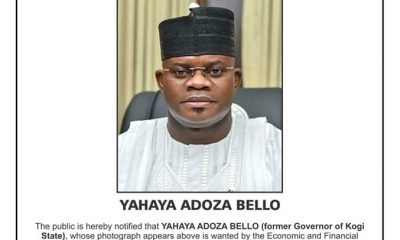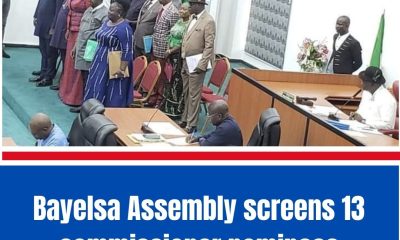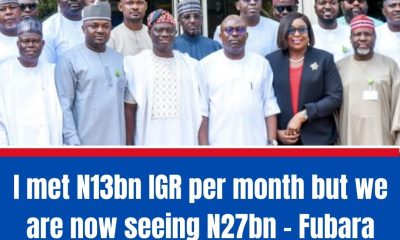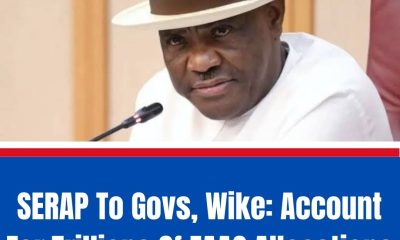News
Shehu: Lack of Fiscal Autonomy, Funding Gaps Threatening Independence of RMAFC

The Chairman, Revenue Mobilisation Allocation and Fiscal Commission (RMAFC), Mr. Mohammed Bello Shehu, has said the absence of financial autonomy and poor funding have directly hindered the effective and efficient performance of the commission’s operations.
Shehu also said annual budgetary allocations for the financing of its activities over the years had been grossly inadequate to protect its independence and cater to its nationwide field operations including monitoring of all revenue-generating agencies, data collection, sensitisation, advocacy, and consultation.
However, a rare glimpse into the template of salaries of political, public and judicial officeholders revealed that the president and his vice earn N26.19 million in Annual Gross Salaries (AGS), and N6.55 million in Annual Basic Salary (ABS).
While the president receives N14.09 million and N3.51 million as AGS and ABS respectively, the vice president earns N12.13 million and N3.03 million as AGS and ABS respectively.
The president’s Monthly Basic Salary (MBS) and Monthly Gross Salary (MGS) are N292,892.08 and N1.17 million respectively while the vice president also earns N252,631.04 and N1.01 million respectively.
In addition, the president is further entitled to N10.54 million which represents 300 per cent of ABS as Severance Allowance.
The remuneration template also showed that the Minister, Secretary to the Government of the Federation (SGF), Head of Service (HOS), and Chairmen of Constitutional Bodies earn N7.80 million, N2.03 million, N650,136.65, and N168, 866.66 respectively as Annual Gross Salary, Annual Basic Salary, Monthly Gross Salary and Monthly Basic Salary with Severance Allowance of N5.87 million.
The Senate President – N2.48 million, N8.69 million, N207,020.30, and N724,570.72 as ABS, AGS, MBS, and MGS as well as a severance package of N7.45 million.
Also, the Deputy Senate President is entitled to N2.31 million as ABS, AGS N8.08 million, MBS N192,430.60, and MGS 673,507 as well as a severance allowance of N6.93 million.
Senators are also entitled to N2.03 million as ABS, AGS N12.77 million, MBS N168,866.70, and MGS N1.06 million as well as N6.08 million as severance allowance.
The Speaker of the House of Representatives earns N2.48 million as ABS, N4.95 million as AGS, N206,425.83 as MBS, and N412,851.66 as MGS as well as N7.43 as severance allowance.
The Deputy Speaker is also entitled to N2.29 million as ABS, AGS N4.95 million, MBS N190,586.20, and MGS N381,172.40 as well as N6.86 million as several packages.
Members of the House of Representatives earn N1.98 million as ABS, N9.53 million as AGS, N165,434.40 as MBS, and MGS N794,086.83 as well as N5.96 million as severance allowance.
Furthermore, findings showed that Chief Justice of Nigeria (CJN) earns N3,36 million ABS, N6.73 million as AGS, N28,331.04 as MBS, and N560,662.16 as MGS as well as N10.09 million as severance allowance.
Also, the Justice of the Supreme Court/President, Court of Appeal are entitled to N2.48 million as ABS, N2.48 as AGS, N206,425.83 as MBS, and N908,273.67 as MGS as well as N7.43 million as severance allowance.
Also, under the remuneration template, a State Governor is entitled to N2.22 million as ABS, N7.78 million as AGS, N185,308.75 as MBS, and N648,580.62 as MGS as well as N6.67 as severance package.
Similarly, a Deputy Governor earns N2.11 million as ABS, N7.39 million as AGS, N176,017.19 as MBS, and N616,062.69 as MGS with N6.33 million as severance allowance.
The Speaker of the State House of Assembly is entitled to N1.63 million as ABS, N2.86 million as AGS, N136,656.25 as MBS, and N239,148.44 as MGS as well as N4.91 million as severance allowance.
Also, Special Advisers/Speech Writers are entitled to ABS of N1.94 million and AGS of N7.09 million as well as N161,906.25 and N590,957.81 as MBS and MGS respectively including N5.83 million as severance package.
The RMAFC is saddled with the responsibility of determining the remuneration packages appropriate for political, public, and judicial office holders as well as advising governments at all levels on the ways to improve their internally-generated revenues.
Nevertheless, Shehu said the sensitive nature of the commission’s role in the country’s fiscal management required a measure of independence including financial autonomy.
Speaking at a breakfast meeting with the Nigeria Guild of Editors (NGE) in Lagos, he noted that the RMAFC remained one of the executive bodies established by the 1999 Constitution of the Federal Republic of Nigeria (As Amended) to among other things monitor the accruals of federally-generated revenues to the federation account and disburse same to the three tiers of government; review from time to time, the revenue allocation formulae and principles in operation to ensure conformity with changing realities.
He said the commission has over the years carried out these important national assignments that contribute to nation-building without blowing its own trumpet.
He said, “For instance, the important role, it plays in the nation’s political economy through the statutory allocation of revenue via an equitable revenue sharing formula to the three tiers of government has enormously contributed to the democratisation process, thus encouraging good governance, transparency and accountability and even development in the country.”
According to him, “Specifically, Section 162(2) and Paragraph 32(b) Part 1 of Third Schedule to the 1999 Constitution (As Amended) empowers the commission to review from time to time the Revenue Allocation Formulae and principles in operation to ensure conformity with changing realities and submit its advice to the president who shall table same before the National Assembly for consideration.
“The review process involves extensive and in-depth research and studies on the issues of Revenue Allocation Formula, call for memoranda, consultations, sensitization workshops, collection and collation of data, studies of other similar Federations in respect of fiscal arrangements, public hearings, and administration of questionnaires.”
He said the exercise normally takes the commission to all the 36 states of the federation and the FCT, as well as the 774 Local Council across the country to sensitize Nigerians to make input into the review process.
However, Shehu, pointed out that emerging developments in fiscal studies from a global perspective and experiences in fiscal management have demonstrated that “development is not totally based on the quantum of money available to any organisation or country but how well funds are managed for the purposes of creating wealth and the corresponding degree of responsibility being born by respective governments”.
He said the commission had since established that the country’s over-dependence on oil and gas revenues despite the abundance of human and natural resources remained the bane of its economic development.
According to him, the imperative of diversifying the nation’s economy cannot be over-emphasized, adding that in order to fulfill the collective aspiration of Nigerians for sustainable development, the three tiers of government and other stakeholders, must focus on the real sector particularly, agriculture, solid minerals, manufacturing, and tourism, whose contributions to the nation’s Gross Domestic Product had declined significantly over the years.
He said fixing appropriate remuneration for public political and judicial office holders at the executive, legislative, judicial arms and different levels of government speaks volumes of the commission’s enormous responsibilities.
He said in view of the overriding importance of RMAFC in the national economy as highlighted above, there is the need to adequately fund the commission through increased budgetary allocation and placement on first-line charge so as to enable it to effectively supervise revenue-generating agencies.
He said, “It is maladroit to expect a poorly funded organisation with ill-motivated staff to perform supervisory functions on well-funded agencies whose staff are adequately remunerated and highly motivated.
“The foregoing reveals the quantum of work the commission is saddled with but without commensurate funding to be able to discharge its constitutional mandate effectively.
“The implications of this is that the commission cannot hire the best, equip and furnish its offices across the country and provide logistics for monitoring owing to its precarious financial position.”
He added that the funding of the commission had been abysmally poor as it is funded via the envelop system which constraints its activities to whatever amount the federal government decides to allocate to it.
-

 Sports4 days ago
Sports4 days agoFA Cup: Man Utd suffer fresh triple injury blow ahead Coventry clash
-

 News7 days ago
News7 days agoPort Harcourt company gifts plot of land to Law Graduate, Anyim Veronica
-

 News7 days ago
News7 days agoJUST-IN: EFCC declares Kogi ex-gov, Yahaya Bello wanted
-

 Politics7 days ago
Politics7 days agoBayelsa Assembly screens 13 commissioner nominees
-

 Business4 days ago
Business4 days agoI met N13bn IGR per month but we are now seeing N27bn – Fubara
-

 News4 days ago
News4 days agoDespite Apology, ABU Zaria Final-Year Law Student Arrested For Defaming Police Officer On Facebook
-

 Politics4 days ago
Politics4 days agoSERAP To Govs, Wike: Account For Trillions Of FAAC Allocations
-

 Crime7 days ago
Crime7 days agoMan arraigned for allegedly stealing N1.2m from dead man’s bank account




















